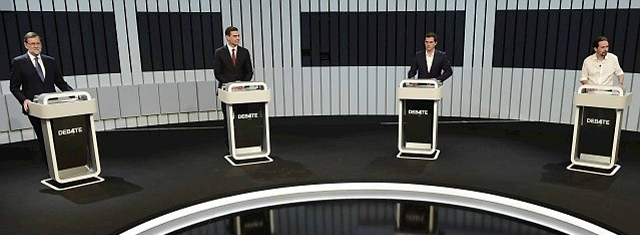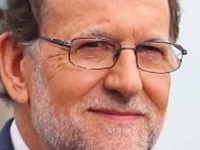Politics
All against Rajoy with reproaches for all
Debate in the Spanish election campaign

The four candidates in the debate (Source: TV Academy)
USPA NEWS -
An all against all, a succession of reproaches. In that the first and only debate to four of the election campaign in Spain, where the three leaders of opposition parties agreed criticizing the Government but failed to stop blaming each other for having failed to agree became.
The discussion revolved its inception on economic issues, precisely the area in which the acting president of the Spanish Government and candidate of the conservative Popular Party (PP), Mariano Rajoy, who used data to refute the accusations of his three opponents, is more comfortable. The Government's economic policy "has failed," said the leader of the coalition between Communists and extreme left populist United we Can, Pablo Iglesias. "There are now fewer people working and fewer people looking for work," he added later in the debate. Iglesias "shares a pretty sad sight of their country," said Rajoy, and recalled that when the PP came to Government "many jobs were destroyed and now created".
"Talking is fine. Then give wheat is more complicated," said Rajoy before announcing that his "goal is to create two million jobs" over the next four years. "Can not you untruthful," he chided later. "75% of Spanish workers have permanent contracts and 25% have a temporary contract," Rajoy said. "Do not try to manipulate reality. Economic growth when I reached the Government was -1.8% and +3.5% today we grow." Faced with such data, Pablo Iglesias stressed that "we have gained three points in inequality. OECD says: macroeconomic data are not good for the citizens."
"It can not be that the consequences of the crisis have fallen on the backs of the workers," said the leader of United we Can. "Recognize that some things have gone wrong." Iglesias had considered the beginning of the debate in the elections of June 26, "there are only two choices: a Popular Party Government or a Government of United we Can". Iglesias and Rajoy polarize the debate, who turned bronco when brought up political corruption. Corruption, Iglesias said, "costs 2,000 euros each Spanish."
To end corruption, the secretary general of the Socialist Party, Pedro Sanchez, considered essential to "end the outcrops and revolving doors" that allow Government officials to enter the boards of big companies. Rajoy is, according to Pedro Sanchez, "the president of a party in B with an accounting B". The acting president of the Spanish Government and the PP candidate defended, however, that "Spain is not a corrupt country." Rajoy accused the Socialist leader: "You would not want to moralize politics with morality in politics," he said. According to the leader of centrist Citizens, Albert Rivera, Rajoy has no moral authority to fight corruption.
On the unity of Spain, conservatives, socialists and Citizens agreed to defend the Spanish sovereignty against Catalan independence project. The leader of Citizens, Albert Rivera, recalled that in the last regional elections, most Catalans voted to remain in Spain, although reforming the Statute of Autonomy. Against all of them, the leader of United we Can, Pablo Iglesias, reiterated his defense of the right to decide on the territories, but insisted his desire that Catalonia is not independent.
Unity and cooperation
The slaughter of Orlando was cause for candidates for Prime Minister give their views on how to fight jihadist terrorism. The secretary general of the Socialist Party, Pedro Sanchez, and the leader of United we Can, Pablo Iglesias, agreed to ask for greater cooperation between the intelligence services of the EU and the US, what Pablo Iglesias added "the creation of an agency controlling international tax havens because they are the key financing jihadism." The leader of Citizens, Albert Rivera, defended the unity of all against terrorism, and Mariano Rajoy spoke of unity but warned that terrorists must chase "here and out of here." Rajoy also defended seamless support the Police and Army fighting jihadism.
At the end of the debate, Rajoy defended governing party candidate that wins the election. However, the leader of United we Can, Pablo Iglesias, was in favor of governing party candidate with the most votes, even among leftist parties, as it announced its intention to propose a pact with the Socialist Party if between the two formations they can reach a sufficient number of MPs to form a Government.
Liability for this article lies with the author, who also holds the copyright. Editorial content from USPA may be quoted on other websites as long as the quote comprises no more than 5% of the entire text, is marked as such and the source is named (via hyperlink).






